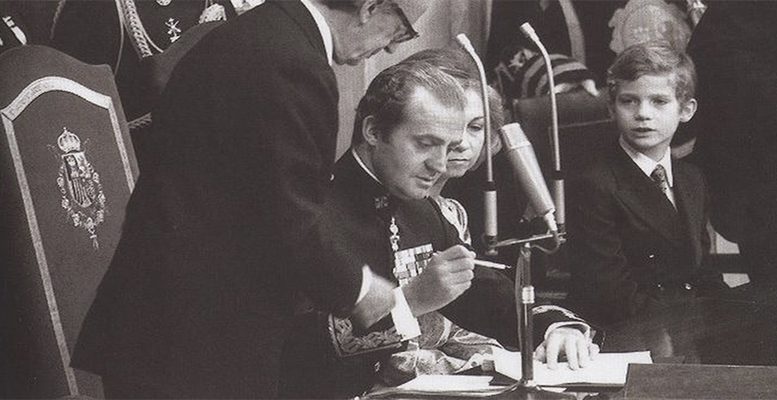Spain and Catalonia’s political agenda for 2018 depends on the government that finally emerges from the December 21 elections in Catalonia. Whether the secessionists lead the new government or not, the question is that they will be back to square one. Firstly, in order to reboot the independence process the hard way or negotiate with a weakened Spanish government. And secondly, inevitably, to go through a negotiated constitutional reform which, amongst other objectives, will aim to satisfy the unrepentant Catalan nationalism.
Whatever happens, what was a crime before will continue to be one now. The tone and the schedule for the secessionists’ strategy and tactics will have to change once they have faced up to reality and verified that many of their assumptions were simply untrue. Believing that all that took place up to now can be buried with an amnesty or a legal blackout would be a remedy which is worse than the illness itself. The rule of law is capital for any democracy and it’s unimaginable that violations against the law can just be thrown in the bin; we are going to see trials and sentences; there will be disqualifications and prison sentences for some, based on the principal of responsability and justice, which should be deaf and blind (but not stupid).
Rajoy’s responsability and his removal
However you look at it, Spain’s democracy has been called into question, in need of reforms which inevitably will be the result of general elections in 2018. Elections to prepare for an updated parliamentary map which measures and weighs up the current parties and their leaders. Amongst them, Rajoy is the key figure. Although his management of the final fase of the Catalan challenge was decisive, it’s clear that he didn’t know how to anticipate the problem, he was indolent, calculated the situation wrongly and is co-responsible for the crisis. Added to this there are the corruption scandals affecting his party, which date back to periods when he was part of its leadership with organic management responsabilities (general secretary, in charge of election campaigns). Mariano Rajoy has proven to be exceptionally astute in concentrating and holding on to all the power in the PP. He has closed the door to any alternative leadership, but has lost the absolute majority, making it very difficult to obtain government pacts. And even more so if a phase of constitutional reform were to begin which requires a consensus from two-thirds of the houses. Rajoy needs to be removed. The PSOE have made their changes and shake off a good part of their past. Voters will judge whether or this has been a good or a bad thing.
That the current Constitution is the best of the ten or so Spain has had is more of a fact than an opinion. In its 40 years of existence, it has served as a framework of reference for a free and progressive co-existence with the best performance in history. But now this Constitution is bursting at the seams; Spanish society and the world as a whole have changed. The model needs to be repaired, particularly with respect to the territorial aspects, the distribution of power and competencies. And of course fitting in the Catalan issue which forms part of the problematic agenda perpetuates from Spain. Perhaps it would be a good idea to start from the principal that there is no permanent fix, although there is room for something to be sorted out for one or two generations.
It’s not true the Constitution was born out of a pact with Catalonia, but more that the latter was born of the Constitution itself and became a reality in the Estatute. A pact between what was left of the former regime, understood as being worn out, and the excluded Spaniards, some of whom were heirs of the II Republic, and other citizens who wanted a democracy which “cast everything into oblivion”. The 1978 Constitution was drawn up between all of them, amid an environment of reconciliation, looking to the future and thinking about Europe and generations to come. And it turned out so well that the Constitution itself anticipated some critical situations like territorial insurgence or the breakdown or exhaustion of some of the constitutional assumptions.
As a response to territorial insurgence, it introduced Article 155, exceptional but normal in federal constitutions; an article not to be used, like the atomic bond, unless it is necessary. The efficiency of Article 155 was obvious from the first minute it came into force. From now on, the Constitution is proposing another exceptional mechanism, but also typical: Article 168, the reform of the Constitution itself, which can be changed and will have to be adapted in order to last.
The mechanism of Article 168 is demanding, diabolical for some, but prudent and intelligent for others. It has three steps: First: both houses have to approve the “principal” of reform with a majority of 2/3. Then Parliament is immediately disolved and elections are called. Second: the new houses ratify the decision and start to analyse the new text of the Constitution which has to be approved by 2/3 of the Congress and the Senate. Third: a referendum in which all Spain can vote.
Three steps which can take up to two-three years, to foster a wide-ranging social and political debate, to facilitate reflection, analysis and the weighing up of the different alternatives and the depth of the reform. A reform project to obtain a new Constitution 2020 (or 2019) with the same values as that of 1978, but adapted to the XXI century, the European Union and future generations.





